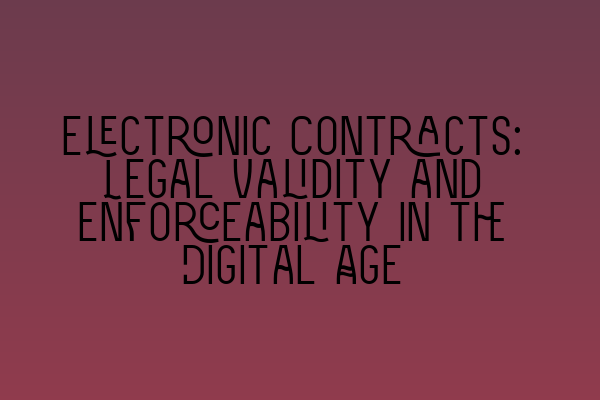Electronic Contracts: Legal Validity and Enforceability in the Digital Age
In today’s digital era, where the internet has become an integral part of our lives, electronic transactions have become increasingly common. As a result, the use of electronic contracts has also gained significant popularity. An electronic contract, also known as an e-contract, is a legally binding agreement created and signed electronically. But how do these contracts hold up in the eyes of the law? Are they as valid and enforceable as traditional paper contracts? Let’s explore the legal validity and enforceability of electronic contracts in more detail.
What Makes an Electronic Contract Legally Valid?
To understand the legal validity of electronic contracts, it’s essential to consider the legal framework that governs them. In the UK, electronic contracts are primarily regulated by the Electronic Communications Act 2000 and the EU Electronic Identification and Trust Services Regulation (eIDAS Regulation). These laws provide the legal basis for the use of electronic signatures and the recognition of electronic contracts.
For an electronic contract to be legally valid, certain elements must be in place. These include offer and acceptance, consideration, intention to create legal relations, and the capacity to contract. The electronic contract must also contain all the necessary terms and conditions that would typically be found in a traditional written contract.
Additionally, the eIDAS Regulation provides guidelines on electronic signatures, confirming that electronic signatures are legally equivalent to handwritten signatures. This means that electronic contracts signed using electronic signatures are just as valid and enforceable as contracts signed with pen and paper.
Offer and Acceptance in Electronic Contracts
One crucial aspect of contract formation is the concept of offer and acceptance. In electronic contracts, this can be achieved through various means, such as clicking an “I accept” button, sending an email expressing acceptance, or even using advanced electronic signature techniques. The important thing is that there is a clear indication of consent by both parties to be bound by the terms of the contract.
Enforceability of Electronic Contracts
Electronic contracts are generally enforceable in the same way as traditional contracts. However, challenges may arise regarding the validity of the electronic signature, the authenticity of the parties involved, or the integrity of the contract itself. To ensure enforceability, it is crucial to follow best practices when creating and executing electronic contracts.
Best Practices for Creating and Executing Electronic Contracts
To strengthen the enforceability of electronic contracts, consider the following best practices:
- Use secure and reliable electronic signature solutions that comply with applicable legal requirements.
- Ensure that the parties’ identities are verified through robust authentication mechanisms.
- Keep a record of the entire electronic transaction, including the offer, acceptance, and any negotiations or amendments.
- Store the electronic contracts securely to maintain their integrity and prevent unauthorized access or tampering.
- Include clear terms and conditions in the electronic contract, addressing key aspects such as payment terms, delivery obligations, and dispute resolution mechanisms.
By adhering to these best practices, you can mitigate any potential challenges to the enforceability of electronic contracts and enhance their legal standing in case of disputes.
Conclusion
Electronic contracts have become a prevalent means of conducting business in the digital age. Although they may initially seem different from traditional paper contracts, they are equally valid and enforceable under the law. By ensuring that all legal requirements are met and following best practices for creating and executing electronic contracts, you can have confidence in their legality and enforceability.
To learn more about contract law and related topics, please check out our other articles:
- Interpreting Contractual Clauses: Unlocking the Hidden Meanings
- Agreements in Contract Law: Understanding Its Various Types
- Essentials of Consideration: Understanding the Basis of Contractual Exchange
- Contract Law Tutorials: Simplifying Complex Concepts for Students
- Discharge of Contracts: Modes and Consequences Explained
